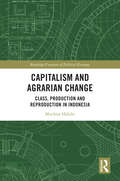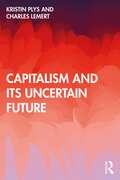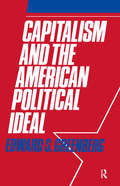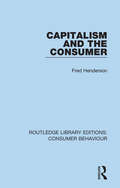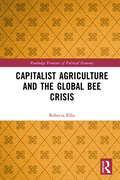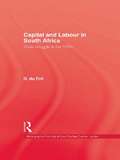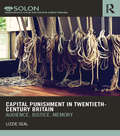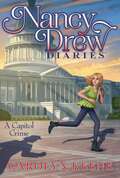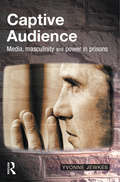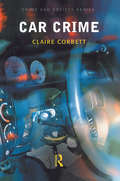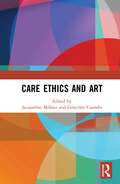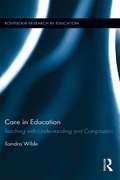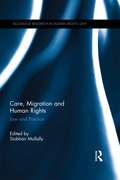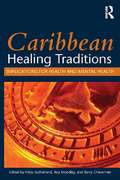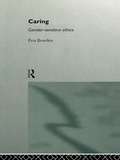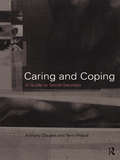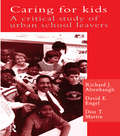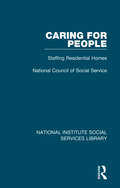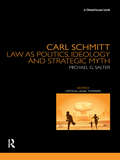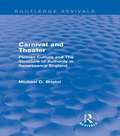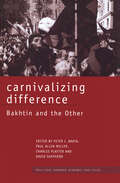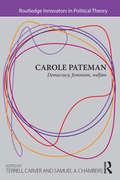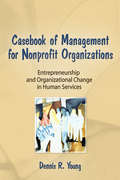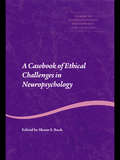Special Collections
Benetech’s Global Certified Accessible Titles
Description: Benetech’s GCA program is the first independent third-party EPUB certification to verify ebook accessibility. By creating content that is born accessible, publishers can meet the needs of all readers. Learn more: https://bornaccessible.benetech.org/
- Table View
- List View
Capitalism and Agrarian Change
by Muchtar HabibiSmall-scale agricultural producers in the peripheral world are often condescendingly assumed to be a single social class (‘the peasantry’) to be pitted against the state or corporation. This book challenges this rather idealistic view by demonstrating that under current capitalist social relations (competition, efficiency and productivity, and profit maximisation), these agricultural producers have been differentiated into different agrarian classes by exploitation. By comparing two different contexts of local agrarian change in Indonesia—rice cultivation in Java and oil palm in Sumatra—this book exposes the different class locations of the agrarian classes among petty agricultural producers and the class relations between them. These are often inextricably linked to gender, clanship and generational issues. The power of class dynamics crucially shapes how agricultural production in both rice and oil palm is organised. The share received by different agrarian classes from the production site then prominently shapes the different nature of class reproduction for each agrarian class. This analysis demonstrates that the different agrarian classes possess different capacities and responses in their relation to the state or corporations. Any real emancipation attempt in the Indonesian countryside (and beyond) must start from a proper understanding of these class dynamics. This book marks a significant contribution to the literature on agrarian change, the political economy of development, rural development and Marxist political economy.
Capitalism and Its Uncertain Future
by Charles Lemert and Kristin PlysFor decades, Charles Lemert has been the leading voice in social theory. In Capitalism and its Uncertain Future he teams up with one of the most creative emerging social theorists, Kristin Plys, to examine how social theory imagines capitalism. This engaging and innovative book provides new perspectives on well known theorists from Adam Smith, and Frantz Fanon, to Gilles Deleuze, while also introducing readers to lesser known theorists such as Lucia Sanchez Saornil, Mohammad Ali El Hammi, and many more. The book examines theories of capitalism from four perspectives: macro-historical theories of the origins of capitalism; postcolonial theories of capitalism that situate capitalism as seen from the Global South; theories of capitalism from the perspective of labor; and prospective theories of capitalism’s uncertain future. This provocative and ambitious, yet accessible, perspective on theories of capitalism will be of interest to anyone who wants to explore where we’ve been and where we’re headed.
Capitalism and the American Political Ideal
by GrenbergThis practical handbook has been revised to provide in-depth coverage of the Office of Thrift and Supervision rules as well as those of the OCC. It includes up-to-date information on every of trust compliance, as it applies in 2000.
Capitalism and the Consumer
by Fred HendersonWritten at a time when the needs and influence of the consumer within the economic system were in their infancy, this book offers a valuable insight into the birth of consumer-led economics as an integral part of social structure and economic theory.
Capitalist Agriculture and the Global Bee Crisis
by Rebecca EllisCapitalist agriculture relies heavily on the pollination work of bees, but this system harms bees in innumerable ways. Indeed, human agriculture is one of the main culprits for the declining populations of wild bees and the declining health of honeybees. This book presents a political ecology of pollination that critically examines how managed honey bees and wild bees are harmed by capitalist agriculture. The book focuses on the three most urgent problems: the standardization and simplification of landscapes through monocultures; the use of pesticides including neonicotinoids, other insecticides, herbicides, and fungicides; and the embeddedness of commercial, migratory beekeeping in the capitalist agriculture system which, among other things, has the potential to spread pests and pathogens across continents. At the heart of this crisis is the power and influence that a small group of agrochemical corporations have over national and international agricultural policy. The book argues for an interspecies alliance of small-scale farmers, bee advocates, beekeepers, environmentalists, and bees themselves, along with a vision for an agricultural system that nurtures multispecies flourishing. This book will be of significant interest to readers of political ecology, animal geography, environmental anthropology, food system studies, and critical animal studies.
Capital & Labour In South Africa
by Du_ToitPublished in the year 1981, Capital & Labour In South Africa is a valuable contrubution to the field of Social Science.
Capital Punishment in Twentieth-Century Britain
by Lizzie SealCapital punishment for murder was abolished in Britain in 1965. At this time, the way people in Britain perceived and understood the death penalty had changed – it was an issue that had become increasingly controversial, high-profile and fraught with emotion. In order to understand why this was, it is necessary to examine how ordinary people learned about and experienced capital punishment. Drawing on primary research, this book explores the cultural life of the death penalty in Britain in the twentieth century, including an exploration of the role of the popular press and a discussion of portrayals of the death penalty in plays, novels and films. Popular protest against capital punishment and public responses to and understandings of capital cases are also discussed, particularly in relation to conceptualisations of justice. Miscarriages of justice were significant to capital punishment’s increasingly fraught nature in the mid twentieth-century and the book analyses the unsettling power of two such high profile miscarriages of justice. The final chapters consider the continuing relevance of capital punishment in Britain after abolition, including its symbolism and how people negotiate memories of the death penalty. Capital Punishment in Twentieth-Century Britain is groundbreaking in its attention to the death penalty and the effect it had on everyday life and it is the only text on this era to place public and popular discourses about, and reactions to, capital punishment at the centre of the analysis. Interdisciplinary in focus and methodology, it will appeal to historians, criminologists, sociologists and socio-legal scholars.
A Capitol Crime
by Carolyn KeeneNancy, Bess, and George look for Nancy&’s missing father in the twenty-second book in the Nancy Drew Diaries series, a fresh approach to a classic series.While Nancy&’s dad is away at a conference in Washington, DC, she invites Bess and George over for a slumber party. The girls are having a great time until Nancy gets a call from a number she doesn&’t recognize. Her dad never showed up for his panel and he isn&’t in his room. No one&’s seen him since the night before, and he isn&’t answering his phone. Worried, Nancy and the gang hop the next flight to DC to investigate. The girls scour the hotel for clues with little luck until Nancy finds her dad&’s cell phone in the hotel basement. She&’s pretty sure he left her a message on the home screen, if only she could figure out what it means. The hunt takes them across the US capital, retracing Mr. Drew&’s steps to figure out what went wrong or who might be out to do him harm. If they don&’t solve this mystery, it may cost Mr. Drew his life.
Captive Audience
by Yvonne JewkesThis book is concerned with the media's role in everyday life, power relations and the construction of masculine identities in the context of prisons. It is based upon unique research into the nature, impact and consequences of a situation where most prisoners in English prisons have access to some media resource, whether radio or television, or with communal or individual access to it. Captive Audience charts for the first time the way in which prisons use media in coping – or failing to cope – with the pressures of prison life, exploring the impact of the media in terms of prisoner identities, shaping power relations between prisoners and other prisoners, and in helping prisoners 'get through' a prison sentence. At the same time this book raises a range of broader issues of theory and practice on the nature of the relationship between prisons, criminal justice systems and society more generally, and on the ways in which the media are conceived in everyday life. It will be of interest to all those concerned with prisons, criminology and the criminal justice system, the social role of the media, and the construction of identity.
Car Crime
by Claire CorbettCrime involving cars – whether involving offences by drivers or theft of and from cars – represents a substantial proportion of offences committed, and occupies an enormous amount of police time. But it is not always perceived as the serious crime that it is: many traffic offences cause enormous harm in terms of death and injury, but are often not regarded seriously by drivers, the criminal justice system and the state. Other than theft of and from cars it is arguable that car crime is socially constructed as 'not real crime' or 'not even crime'. This book is the first to survey the whole area of car crime. It considers car crime as a coherent whole, addressing the concept of car culture; considers car crime in its various guides in relation to issues such as masculinity, gender, car usage and the environment; considers the historical roots of legislation concerning crime committed in the car, through to current legislation and its effects and implications. The book also addresses issues of crime prevention, and in particular the role of car manufacturers in making cars more crime proof.
Care Ethics and Art
by Jacqueline MillnerWhat would it mean to substitute care for economics as the central concern of politics? This anthology invites analysis, reflections and speculations on how contemporary artists and creative practitioners engage with, interpret, and enact care in practices which might forge an alternative ethics in the age of neoliberalism. Interdisciplinary and innovative, it brings together contributions from artists, researchers and practitioners who creatively consider how care can be practised in a range of contexts, including environmental ethics, progressive pedagogies, cultures of work, alternative economic models, death literacy advocacy, parenting and mothering, deep listening, mental health, disability and craftivism. Care Ethics and Art contributes new modes of understanding these fields, together with practical solutions and models of practice, while also offering new ways to think about recent contemporary art and its social function. The book will benefit scholars and postgraduate research students in the fields of art, art history and theory, visual cultures, philosophy and gender studies, as well as creative and arts practitioners.
Care in Education
by Sandra WildeThis philosophical commentary explores the meaning and significance of care in education, demonstrating how teaching with care enriches the art and soul of pedagogy. Wilde draws upon Western and Eastern philosophies that envision an integrated image of care to illuminate the value of cultivating understanding in the form of awareness, and compassion leading to right action. Comments and stories from teachers’ experiences demonstrate important aspects of care that are easily overlooked, such as present attention, listening and teacher, well-being. Although it uncovers a tragic conflict between caring and aspects of contemporary schooling, this book offers hope for teachers. It shares a vision of practice that has the potential to re-enliven and strengthen care even in the midst of these difficulties. It also offers a contemplative approach to pedagogy that calls educators into intentional action, showing them how to renew their deep ethical connections to students, to subject matter and to the world.
Care, Migration and Human Rights
by Siobhán MullallyThe continuum of exploitation that has historically defined the everyday of domestic work - exclusion from employment and social security standards and precarious migration status – has frequently been neglected. It is primarily the moments of crisis, incidents of human trafficking, slavery or forced labour, that have captured the attention of human rights law. Only recently has human rights law has begun to address the structured inequalities and exclusions that define the domain of domestic work. This book addresses the specific position of domestic workers in the context of evolving human rights norms. Drawing upon a broad range of case studies, this book presents a thorough examination of key issues such as the commodification of care, the impact of the jurisprudence of the Court of Justice of the European Union and the European Court of Human Rights on ‘primary care providers’, as well as the effect that trends in migration law have on migrant domestic workers. This volume will be of interest to lawyers, academics and policy makers in the fields of human rights, migration, and gender studies.
Caribbean Healing Traditions
by Implications For Health and Mental HealthAs Caribbean communities become more international, clinicians and scholars must develop new paradigms for understanding treatment preferences and perceptions of illness. Despite evidence supporting the need for culturally appropriate care and the integration of traditional healing practices into conventional health and mental health care systems, it is unclear how such integration would function since little is known about the therapeutic interventions of Caribbean healing traditions. Caribbean Healing Traditions: Implications for Health and Mental Health fills this gap. Drawing on the knowledge of prominent clinicians, scholars, and researchers of the Caribbean and the diaspora, these healing traditions are explored in the context of health and mental health for the first time, making Caribbean Healing Traditions an invaluable resource for students, researchers, faculty, and practitioners in the fields of nursing, counseling, psychotherapy, psychiatry, social work, youth and community development, and medicine.
Caring
by Peta BowdenIn Caring, Peta Bowden extends and challenges recent debates on feminist ethics. She takes issue with accounts of the ethics of care that focus on alleged principles of caring rather than analysing caring in practice. Caring, Bowden argues, must be understood by 'working through examples'. Following this approach, Bowden explores four main caring practices: mothering, friendship, nursing and citizenship. Her analysis of the differences and similarities in these practices - their varying degrees of intimacy and reciprocity, formality and informality, vulnerability and choice - reveals the practical complexity of the ethics of care. Caring recognizes that ethical practices constantly outrun the theories that attempt to explain them, and Bowden's unique approach provides major new insights into the nature of care without resorting to indiscriminate unitary models. It will be essential reading for all those interested in ethics, gender studies, nursing and the caring professions.
Caring and Coping
by Terry Philpot and Anthony DouglasCaring and Coping provides a clear and accessible explanation of the history, politics, management, funding and day-to-day work of the social services in Britain. Social Care now encompasses a wide range of increasingly specialised professions. Caring and Coping aims to improve the practitioner's (and the general public's) understanding not only of what these various professions do, but also what the legal, political, ethical and financial constraints are upon them. It succinctly addresses issues such as:* the terms and effects of the Children Act and the Community Care Act* the role of charities in the modern welfare state* the role of management* relationships with other agencies* and the place of social work within the community. Social services are so often portrayed in the media in a sensationalist way and this book counterbalances the hype by providing solid research and a more down-to-earth picture. It is an ideal introductory text for those training to be social workers.
Caring For Kids
by Richard J. Altenbaugh and Rodney R Cocking and David E. Engel and Don T. MartinThe official school drop-out figure in the US in recent years has been 25 per cent of the cohort. Estimates from large cities are often double these rates, and in some areas 60 per cent or worse. This text focuses on this problem in US schools, but from an unusual perspective. It is a study gained from in-depth interviews of 100 "stop-outs" - that is, those who dropped out but then decided to return to school. Four basic questions are posed by this text: who drops out?; why did they drop out?; what caused them to return?; and what intervention policies can be formulated to prevent students dropping out in the first place? The answers provided by this text for the last question are intended to make it of particular interest to school administrators.
Caring for People
by National Council of Social ServiceIn the 1960s, the work of caring for the quarter of a million people – men, women and children – who lived in old people’s homes, approved schools, hostels for the handicapped and so on was one which needed great skill and knowledge. There was already difficulty in recruiting enough of the right kind of staff for this purpose, and the problem would grow more serious, both on account of the increasing numbers to be cared for and the competition from other kinds of employment. Originally published in 1967, this Report was the result of the deliberations of a committee of enquiry of experts, most of who had been intimately concerned with the residential services, either statutory or voluntary, for many years. It analysed the problems concerning those who were engaged in this difficult, skilful and rewarding task, and suggested ways in which they could be helped by their employers, their committees and the community. It made many recommendations covering conditions of work, recruitment and the career structure. It laid special stress on the need for training and outlined a possible scheme of training at different levels. This long-awaited Report, written with knowledge and compassion, would be widely read by government departments, by Local Authorities and by all those concerned with people in care. It became something of a landmark in the development of the social services.
Carl Schmitt
by Michael G. SalterThere continues to be a remarkable revival in academic interest in Carl Schmitt's thought within politics and social theory but this is the first book to address his thought from an explicitly legal theoretical perspective. Transcending the prevailing one-sided and purely historical focus on Schmitt’s significance for debates that took place in the Weimar Republic 1919-1933, this book addresses the actual and potential significance of Schmitt's thought for controversies within contemporary Anglo-American legal theory that have emerged during the past three decades. These include: the critique of liberal forms of legal positivism; the relative ‘indeterminacy’ of legal doctrine and the need for an explicitly interpretative approach to its range of meanings, their scope and policy rationale; the centrality of discretion and judicial law-making within the legal process; the important role played by ideological prejudices and assumptions in legal reasoning; the reinterpretation of law as a form of strategically disguised politics; the legal theoretical critique of universalistic approaches to "human" rights and associated liberal-cosmopolitan 'ideologies of humanity,' including the rhetoric of 'humanitarian intervention'; and the limitations of liberal constitutionalism and liberalism more generally as an approach to law. In Carl Schmitt: Law as Politics, Ideology and Strategic Myth, the author provides an overview and assessment of Schmitt's thought, as well as a consideration of its relevance for contemporary legal thought and debates.
Carnival and Theater
by Michael D. BristolIn this title, first published in 1985, Michael Bristol draws on several theoretical and critical traditions to study the nature and purpose of theatre as a social institution: on Marxism, and its revisions in the work of Mikhail Bakhtin; on the theories of Emile Durkheim and their adaptations in the work of Victor Turner; and on the history of social life and material culture as practiced by the Annales school. This valuable work is an important contribution to literary criticism, theatre studies and social history and has particular importance for scholars interested in the dramatic literature of Elizabethan England.
Carnivalizing Difference
by Paul Allen Miller and David Shepherd and Charles Platter and Peter I. BartaIt has seemed at times that there is no neutral territory between those who see Bakhtin as the practitioner of a kind of neo-Marxist, or at least materialist, deconstruction and those who look at the same texts and see a defender of traditional, liberal humanist values and classical conceptions of order, a conservative in the true sense of the term. Arising from a conference under the same title held at Texas Tech University, Carnivalizing Difference seeks to explore the actual and possible relationships between Bakhtinian theory and cultural practice. The introduction explores the changing configurations of our understanding of Bakhtin's work in the context of recent theory and outlines how that understanding can inform, and be informed by, culture both ancient and modern. Eleven articles, spanning a wide range of periods and cultural forms, then address these issues in detail, revealing the ways in which Bakhtinian thought illuminates, sometimes obfuscates, but always challenges.
Carole Pateman
by Terrell Carver and Samuel A. ChambersCarole Pateman’s writings have been innovatory precisely for their qualities of engagement, pursued at the height of intellectual rigour. This book draws from her vast output of articles, chapters, books and speeches to provide a thematic yet integrated account of her innovations in political theory and contributions to the politics of policy-making. The editors have focused on work in three key areas: Democracy Pateman’s perspective is rooted in a practical perspective, enquiring into and speculating about forms of participation over and above the ‘traditional’ exclusions through which representative systems have been variously constructed over time. Her work pushes hard on theorists and politicians who make easy assumptions about apathy and public opinion, who bracket off the workplace and the home, and who see politics only in partisan activity, voter behaviour and governmental policy. Women Pateman’s innovatory and still-cited work on participation antedates the feminist revolution in political theory and many of the practical struggles that developed through the later 1970s. While woman-centred, her concerns were always worked through larger conceptions of social class, economic advantage, power differentials, ‘liberal’ individualism and contracts including marriage. Her feminism was innovative in political theory, and within feminism itself. As a feminist Pateman defies categorization, and her concepts of ‘the sexual contract’ and ‘Wollstonecraft’s dilemma’ are canonical. Welfare Pateman’s innovation here is an integration of welfare issues – in particular the proposals for a ‘basic income’ or for a ‘capital stake’ – into her broad but always rigorous conception of democracy. This is argued through in terms of citizenship, taken as the result of a social contract. In that way Pateman puts liberalism itself through an imminent critique, drawing in the practicalities and risks of life in late capitalist societies. Her theory as always is political, taking in neo-liberal attacks on ‘welfare states’ and the stark realities of international inequalities. Pateman’s career achievements in democratic and feminist theory are brought productively to bear on debates that would otherwise occur in more limited, and less provocative, academic and political contexts.
Carry Me Home
by Janet Fox&“A poignant and powerful reminder that homelessness is not hopelessness.&” —Kirby Larson, author of Newbery Honor book Hattie Big Sky &“A beautiful, haunting story… It carried my heart away with it.&” —Ann Braden, author of The Benefits of Being an Octopus &“A story about falling through the cracks and finding the light inside that darkness…Absorbing, moving, and deeply truthful.&” —Martha Brockenbrough, author of The Game of Love and Death Two sisters struggle to keep their father&’s disappearance a secret in this tender middle grade novel that&’s perfect for fans of Katherine Applegate and Lynda Mullaly Hunt.Twelve-year-old Lulu and her younger sister, Serena, have a secret. As Daddy always says, &“it&’s best if we keep it to ourselves,&” and so they have. But hiding your past is one thing. Hiding where you live—and that your Daddy has gone missing—is harder. At first Lulu isn&’t worried. Daddy has gone away once before and he came back. But as the days add up, with no sign of Daddy, Lulu struggles to take care of all the responsibilities they used to manage as a family. Lulu knows that all it takes is one slip-up for their secret to come spilling out, for Lulu and Serena to be separated, and for all the good things that have been happening in school to be lost. But family is all around us, and Lulu must learn to trust her new friends and community to save those she loves and to finally find her true home.
Casebook Management For Non-Profit Organizations: Enterpreneurship & Occup
by Simon Slavin and Dennis YoungAn essential and unique contribution to the social organizational literature, Casebook of Management for Nonprofit Organizations highlights the importance of good management to human service organizations. Author Dennis Young uses case studies that stress entrepreneurship and are addressed to particular aspects of human services management--the processes of new program development and the management of organization change. Written in nontechnical, readable language, the cases deal with a wide array of types of organizational change, ranging from development of new programs to the birth of new organizations, the merger of organizations, and the expansion and diversification of the service offerings of various agencies. Moreover, the cases touch on many other intrinsic aspects of organizational administration including management of professionals and other staff, working with trustees, financing programs through government and private sources, coping with governmental regulatory processes, and managing relationships with organizational clients and constituent groups.
A Casebook of Ethical Challenges in Neuropsychology
by Shane S. BushThe American Psychological Association published a revision of the Ethical Principles of Psychologists and Code of Conduct in 2002.This text, a companion to the 2002 text Ethical Issues in Clinical Neuropsychology by Bush and Drexler, presents the reader with common ethical challenges in neuropsychology. This text examines the differences between the 1992 and 2002 APA Ethics Codes as they relate to neuropsychological activities.The authors present cases and discuss ethical issues related to neuropsychological practice with a variety of patient populations and in a variety of clinical settings. In addition, ethical issues in neuropsychological research and test development are examined. The text also includes chapters on emerging and particularly challenging aspects of neuropsychological practice, such as the assessment of response validity, and the use of information technology and telecommunications. Through the use of case illustrations, the authors examine ethical issues in neuropsychology and the new Ethics Code, offering a practical approach for understanding and promoting ethical neuropsychological practice.
